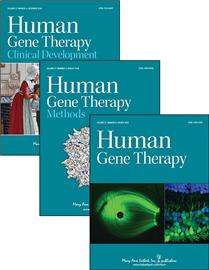Credit: Mary Ann Liebert, Inc., publishers
Researchers are beginning to gain a clearer understanding of how the immune system responds, in both a reactive and tolerant way, to gene therapy delivered using what has become the preferred gene delivery vector, adeno-associated viruses (AAV). A new review that takes a comprehensive look at both the AAV-mediated immune reactivation response to gene transfer and the role that regulatory and exhausted T cells play in the development of tolerance to AAV is published in Human Gene Therapy.
Gwladys Gernoux and Christian Mueller, University of Massachusetts Medical School, Worcester, MA and James M. Wilson, Perelman School of Medicine, University of Pennsylvania, Philadelphia, highlight the latest research in the new area of biomedical discovery focused on immunologic responses to AAV and the immune mechanisms that regulate chronic infections. In the article entitled, "Regulatory and Exhausted T Cell Responses to AAV Capsid," the researchers discuss the complexity of the immune response to AAV, the broad variability in responses between individual patients exposed to AAV vectors, strategies in development to suppress an immune reaction to viral vector components, and the implications of this evolving research area to future developments in AAV-based gene therapy.
"Several groups have observed very long-term expression of rAAV vectors in humans even in the face of immune responses to the capsid. The Treg and exhausted T cell responses that this article discusses may be the key to explaining this property, which appears to be critical for the clinical success of AAV as a vector," says Editor-in-Chief Terence R. Flotte, MD, Celia and Isaac Haidak Professor of Medical Education and Dean, Provost, and Executive Deputy Chancellor, University of Massachusetts Medical School, Worcester, MA.
More information: Gwladys Gernoux et al, Regulatory and Exhausted T Cell Responses to AAV Capsid, Human Gene Therapy (2017). DOI: 10.1089/hum.2017.022
Journal information: Human Gene Therapy
Provided by Mary Ann Liebert, Inc






















